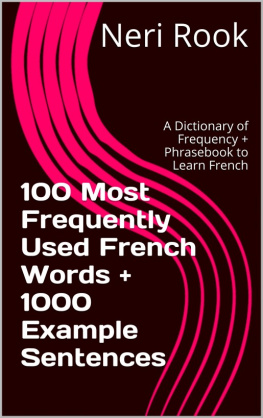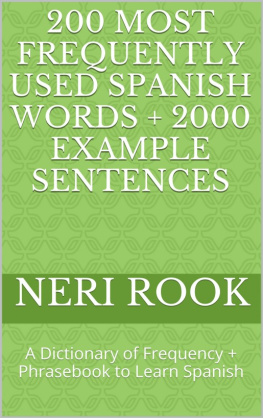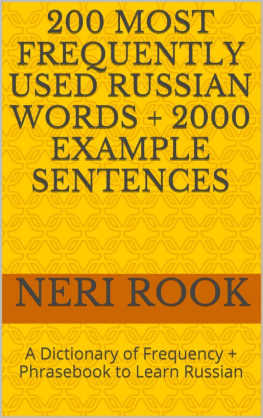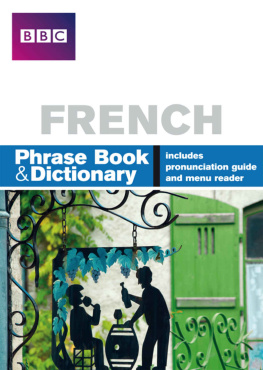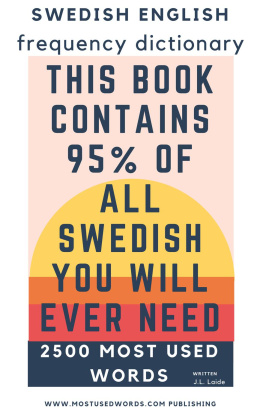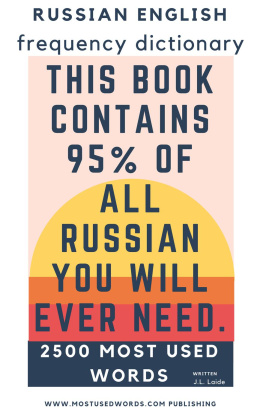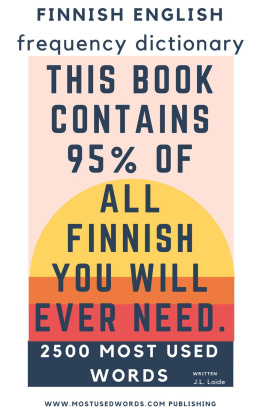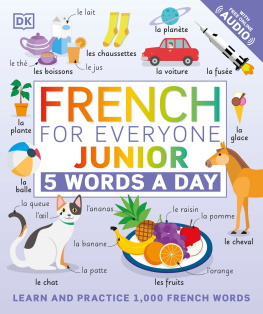100 Most Frequently Used French Words + 1000Example Sentences: A Dictionary of Frequency + Phrasebook to LearnFrench
Neri Rook
Copyright Neri Rook, 2015 all rightsreserved. No part of this book may be reproduced, scanned ordistributed in any printed or electronic form without permission.Please do not make illegal copies of this book, your support forthe author is appreciated.
Introduction
This book contains the
100 mostfrequently used French words with
10 example sentenceseach. Sometimes an example sentence will berepeated, but with an alternate translationso you can look at thesentence from a different angle. For the most part, the example sentencesare ordered from easiest to hardest. I hope that this book serves as wonderfullearning reference. ] > Je te lai dit ! [ I told you so. ] > tout lheure ! [ See you soon! ] > a a lair bien ! [ That sounds good! ] > De quoi aa lair ? [ What does it look like? ] > De quoi aa lair ? [ How does it look? ] > Je lai trouv ! [ I've found it. ] > Je vais tre en retard lcole ! [ I'll be late for school! ] > Qui la fait ? [ Who did it? ] > Ta femmem'a vu et te la dit ? [ Your wife saw me and told you? ] [2] DE > Je ne veuxpas de a ! [ I don't want that. ] > Ne parle pas de moi ! [ Don't talk about me. ] > Qui est le plus grand de tous ? [ Who is the tallest of all? ] > Qui nepense pas de mme ? [ Who doesn't think so? ] > Il y a trop de choses faire ! [ There are too many things to do! ] > Tu ne veuxpas de cela, si ? [ You don't want that, do you? ] > C'est lavoiture de qui ? [ Whose car is that? ] > Il fait un temps de chien [ What horrible weather. ] > Qui est en train de lire ? [ Who is reading? ] > C'est la chambre de qui ? [ Whose room is this? ] [3] > Qui est la maison ? [ Who is in the house? ] > Il y atrop de choses faire ! [ There are too many things to do! ] > Cettechose est toi ? [ Is that thing yours? ] > tout lheure ! [ See you soon! ] > Ne parle personne ! [ Don't talk to anyone. ] > Vous avez quelque chose me dire ? [ Do you have something that you want to sayto me? ] > Je suis tout fait d'accord ! [ I agreecompletely. ] > Ne fais demal personne ! [ Don't hurt anyone. ] > Je ne comprends rien ce qu'il dit [ I don't understand a word of what he says.] > Tu asquelque chose manger ? [ Have you anything to eat? ] [4] LA > Qui est la maison ? [ Who is in the house? ] > Qui est dans la maison? [ Who is in the house? ] > Je dois la voir ! [ I have to see it! ] > C'est la vie ! [ This is life! ] > C'est la vie ! [ So goes life! ] > C'est lavoiture de qui ? [ Whose car is that? ] > C'est la chambre de qui ? [ Whose room is this? ] > Comment est la vie ? [ How's life? ] > Comment est la vie ? [ How is life? ] > Tu la connais ? [ Do you know her? ] [5] PAS > Ne me suis pas ! [ Don't follow me. ] > Je ne suis pas comme vous ! [ I'm not like you! ] > Tu ne peux pas le faire, si ? [ You can't do it, can you? ] > Moi je nesuis pas comme vous ! [ I'm not like you! ] > Tu ne peux pas ou tu ne veux pas ? [ You can't or you won't? ] > Je ne suis pas un homme ! [ I'm not a man! ] > Je ne suis pas un homme ! [ I am not a man! ] > Je ne veuxpas de a ! [ I don't want that. ] > Ne parle pas de moi ! [ Don't talk about me. ] > Ne me parle pas ! [ Don't talk to me! ] [6] LE > Je peux le faire ! [ I can do this. ] > Tu peux le faire ! [ You can do it. ] > Tu ne peux pas le faire, si ? [ You can't do it, can you? ] > Qui est le plus grand de tous ? [ Who is the tallest of all? ] > Tu ne lelui as pas fait dire ! [ That's told him! ] > a ne va pas le faire ! [ It's not gonna be fine! ] > Tu ne leveux pas vraiment, si ? [ You don't really want that, do you? ] > Je dois le voir ! [ I have to see it! ] > a tu nele lui as pas fait dire ! [ That's told him! ] > Ne le fais pas ! [ Don't do it! ] [7] QUE > Il est plus que grand temps ! [ It's high time to get going! ] > C'est toutce que tu as ? [ That all you've got? ] > C'est aussi bon que a ?! [ It's THAT good?! ] > Je ne fais que parler ! [ I'm just saying! ] > Tu comprends ce que je veux dire ? [ Do you see what I mean? ] > Tu vois ceque je veux dire ? [ You see what I mean? ] > Tu leconnais aussi bien que a ? [ Do you know him that much? ] > C'estcomme a que tu fais ! [ That's how you do it! ] > Demande ceque tu veux ! [ Ask for what you want! ] > Demande qui que ce soit ! [ Ask anybody. ] [8] EST > Il est temps ! [ It's about time. ] > qui est ce livre ? [ Whose book is this? ] > qui est ce livre ? [ Whose book is that? ] > Qui est la maison ? [ Who is in the house? ] > Il est bien temps ! [ It's about time. ] > Qui est le plus grand de tous ? [ Who is the tallest of all? ] > Il est plus que grand temps ! [ It's high time to get going! ] > Il est si grand ! [ It's so big! ] > Il est grand temps ! [ It's about time. ] > Qui est dans la maison? [ Who is in the house? ] [9] VOUS > Je suis avec vous [ I'm by your side. ] > Je ne suis pas comme vous ! [ I'm not like you! ] > Moi je nesuis pas comme vous ! [ I'm not like you! ] > Je ne vous dois rien ! [ I don't owe you squat! ] > Je vous lai dit ! [ I told you so. ] > a vous afait mal ? [ Did it hurt? ] > Que vous tes grand ! [ How tall you are! ] > Qui vous a donn a ? [ Who gave you this? ] > Comme vous tes grand ! [ How tall you are! ] > Que vous tes grande ! [ How tall you are! ] [10] UN > Je ne suis pas un homme ! [ I'm not a man! ] > Je ne suis pas un homme ! [ I am not a man! ] > Il y a un chien ! [ There is a dog! ] > Il y a un chien ! [ There's a dog! ] > Il fait un temps de chien [ What horrible weather. ] > Encore un peu ? [ A little more? ] > Il y a un problme ? [ Is there a problem? ] > Je peux avoir un reu ? [ May I have a receipt? ] > C'est un problme ! [ This is a problem! ] > Vous avez un problme ? [ What is wrong with you? ] [11] NE > Je ne suis pas comme vous ! [ I'm not like you! ] > Tu ne peuxpas le faire, si ? [ You can't do it, can you? ] > Moi je nesuis pas comme vous ! [ I'm not like you! ] > Tu ne peux pas ou tu ne veux pas ? [ You can't or you won't? ] > Je ne suis pas un homme ! [ I'm not a man! ] > Je ne suis pas un homme ! [ I am not a man! ] > Je ne veuxpas de a ! [ I don't want that. ] > Qui ne pense pas de mme ? [ Who doesn't think so? ] > Tu ne le lui as pas fait dire ! [ That's told him! ] > tre ou ne pas tre ? [ To be or not to be? ] [12] CE > qui estce livre ? [ Whose book is this? ] > qui est ce livre ? [ Whose book is that? ] > C'est tout ce que tu as ? [ That all you've got? ] > Tu comprends ce que je veux dire ? [ Do you see what I mean? ] > Tu vois ceque je veux dire ? [ You see what I mean? ] > De quoiparle ce livre ? [ What is the book about? ] > Demande ceque tu veux ! [ Ask for what you want! ] > Fais ce qu'il dit ! [ Do what he says. ] > O va ce livre ? [ Where does this book go? ] > qui est ce livre sur le bureau ? [ Whose book is this on the desk? ] [13] A > Qui a faita ? [ Who did this? ] > Il y a trop de choses faire ! [ There are too many things to do! ] > Il y a un chien ! [ There is a dog! ] > Il y a un chien ! [ There's a dog! ] > a vous a fait mal ? [ Did it hurt? ] > Qui a dit cela ? [ Who said that? ] > Il y a un problme ? [ Is there a problem? ] > Il y a quelqu'un ? [ Is anybody here? ] > Il y a quelque chose entre vous? [ Is there anything between you? ] > Qui a eucette ide ? [ Who had this idea? ] [14] UNE > Tu veux une voiture ? [ Do you want a car? ] > Un chat n'est pas une personne ! [ A cat is not a person! ] > Un garon ou une fille ? [ Is it a boy or a girl? ] > C'est une bonne fille [ She's a good girl. ] > Qui a crit une lettre ? [ Who wrote a letter? ] > C'est une belle journe ! [ It's a beautiful day! ] > Je peux te poser une question? [ Can I ask you a question? ] > Ma vie pour une bire ! [ I'm dying for a beer! ] > Passe une bonne journe ! [ Have a nice day. ] > Je te souhaite une bonne journe ! [ I hope you have a great day! ] [15] LES > Pourquoipas les deux ? [ Why not both? ] > O sont les garons ? [ Where are the boys? ] > O sont tous les autres ? [ Where are all the others? ] > O sont tous les autres ? [ Where's everybody else? ] > O sont tous les autres ? [ Where's everyone else? ] > O sont les autres ? [ Where are the others? ] > O sont les pommes ? [ Where are the apples? ] > O sont les filles ? [ Where are the girls? ] > O sont toutes les autres ? [ Where's everybody else? ] > O sont toutes les autres ? [ Where's everyone else? ] [16] JE > Moi je ne suis pas comme vous ! [ I'm not like you! ] > Tu sais qui je suis ? [ Do you know me? ] > Moi je ne suis pas comme toi ! [ I'm not like you! ] > Tu comprends ce que je veux dire ? [ Do you see what I mean? ] > Tu vois ceque je veux dire ? [ You see what I mean? ] > Ne me dispas ce que je sais dj ! [ Don't tell me what I already know. ] > Ne me dispas ce que je sais ! [ Don't tell me what I know. ] > Comme jesuis content de te voir ! [ How glad I am to see you! ] > Je pense donc je suis [ I think therfore I am ] > Que jesuis heureux aujourd'hui ! [ How happy I am today! ] [17] EN > Je ne peux plus en prendre ! [ I can't take any more! ] > Qui est en train de lire ? [ Who is reading? ] > Qui est en train de regarder ? [ Who's watching? ] > Tu vas luien parler ? [ Are you going to tell him? ] > Tu vas luien parler ? [ Are you going to tell her? ] > Tu en as peur? [ Are you afraid of it? ] > Tu y vasen train ou en voiture ? [ Do you go by train or by car? ] > Vous en avez peur? [ Are you afraid of it? ] > Je vaistre en retard lcole ! [ I'll be late for school! ] > Tu es venu en train ou en bus ? [ Did you come here by train or by bus? ] [18] POUR > Au temps pour moi ! [ My bad! ] > Au temps pour moi ! [ My mistake! ] > Et pour quoi ? [ And for what? ] > Tout est si nouveau pour moi! [ Everything is so new to me! ] > Tu meprends pour qui ? [ What do you take me for? ] > Tu meprends pour qui ?! [ Who do you think I am? ] > Tu meprends pour qui ?! [ What do you take me for?! ] > C'est facile dire pour toi ! [ You can talk well! ] > C'est donc pour a ! [ So that's why! ] > Ne risquepas ta vie pour moi ! [ Don't risk your life for me. ] [19] TU > Tu ne peuxpas ou tu ne veux pas ? [ You can't or you won't? ] > C'est toutce que tu as ? [ That all you've got? ] > a tu ne le lui as pas fait dire ! [ That's told him! ] > Que tu es grand ! [ How tall you are! ] > Comment a tu ne sais pas ? ! [ What do you mean you don't know?! ] > C'estcomme a que tu fais ! [ That's how you do it! ] > Demande ceque tu veux ! [ Ask for what you want! ] > Comme tu es grand ! [ How tall you are! ] > Comme tu es grand ! [ How big you are! ] > Si tu veuxparler, parle ! [ If you want to talk, talk. ] [20] SUIS > Ne me suispas ! [ Don't follow me. ] > Je suis avec vous [ I'm by your side. ] > Je ne suis pas comme vous ! [ I'm not like you! ] > Moi je ne suis pas comme vous ! [ I'm not like you! ] > Je ne suis pas un homme ! [ I'm not a man! ] > Je ne suis pas un homme ! [ I am not a man! ] > Tu saisqui je suis ? [ Do you know me? ] > Je ne suis pas comme toi ! [ I'm not like you! ] > Moi je ne suis pas comme toi ! [ I'm not like you! ] > Je suis tout fait d'accord ! [ I agree completely. ] [21] DES > Quel est le plus cher des deux ? [ Which is the more expensive of the two?] > Ne te faispas des ides ! [ Don't get any ideas. ] > Ne vous faites pas des ides ! [ Don't get any ideas. ] > Qui est la plus jolie des filles ? [ Who is the prettiest of the girls? ] > Tu as desplans pour ce soir ? [ Do you have plans for tonight? ] > Il me donne des coups de pied ! [ He's kicking me! ] > Lequel est le plus lourd des deux ? [ Which is the heavier of the two? ] > Mets des vtements ! [ Put some clothes on. ] > J'en aimarre des devoirs ! [ I'm fed up with homework. ] > Mange des fruits ! [ Eat fruit! ] [22] DANS > Qui est dans la maison? [ Who is in the house? ] > Ne va pasdans ma chambre ! [ Don't go in my room. ] > Qui est dans cette pice ? [ Who is in this room? ] > Il y a quelqu'un dans la pice ? [ Is there anyone in the room? ] > Qui vit dans cette maison ? [ Who lives in that house? ] > Qui vit dans cette maison ? [ Who lives in this house? ] > Va dans ta chambre ! [ Go to your room. ] > Va dans ta chambre ! [ Go to your room! ] > Que fait ce monsieur, dans la vie ? [ What does that gentleman do for a living?] > Je veux aller dans mon lit ! [ I want to go to my bed! ] [23] ME > Ne me suispas ! [ Don't follow me. ] > Ne me parle pas ! [ Don't talk to me! ] > Ne me parle pas ! [ Don't talk to me. ] > Ne me parle jamais plus ! [ Don't ever talk to me again. ] > Ne meparle pas du travail ! [ Don't talk to me about work. ] > Ne me faispas faire a ! [ Don't make me do this. ] > Tu ne mecrois pas ? [ Don't you believe me? ] > Ne me parle plus jamais comme a ! [ Don't ever speak to me like that! ] > Ne me faispas a ! [ Don't you do this to me. ] > Vous avezquelque chose me dire ? [ Do you have something that you want to sayto me? ] [24] ET > Je vais bien, et toi ? [ I'm fine. ] > Vous avezquelque chose me dire ? [ Do you have something that you want to sayto me? ] [24] ET > Je vais bien, et toi ? [ I'm fine.

